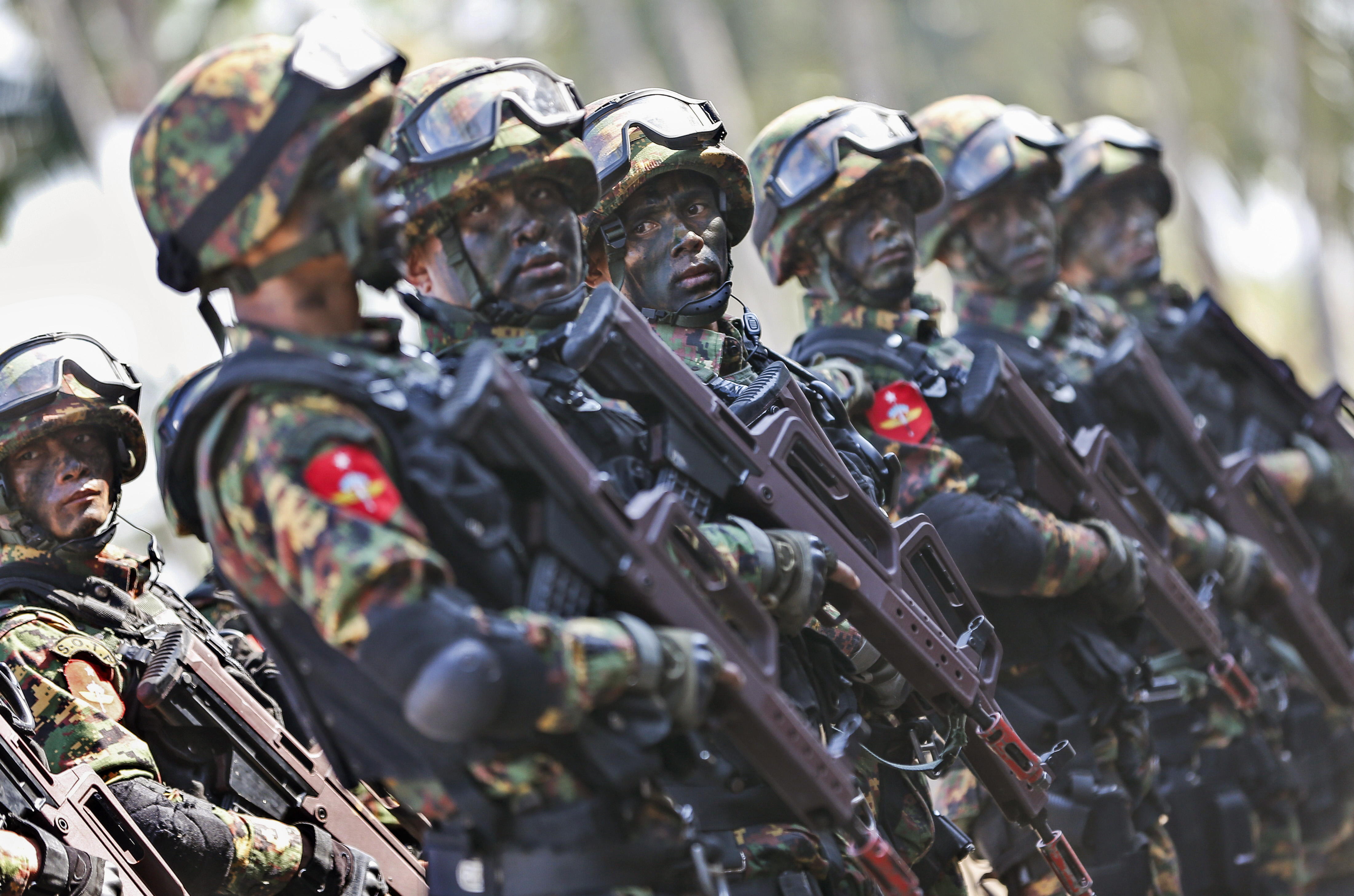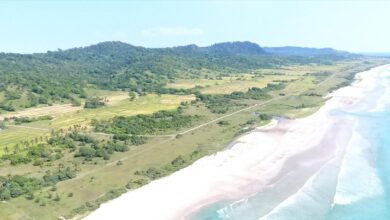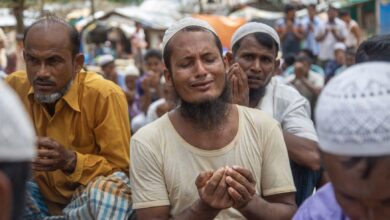
As a boy, Zay Thu Aung was obsessed with the flying scenes in movies and in his favourite show, Power Rangers. It seemed only natural, then, that he would grow up to become a fighter pilot.
“It was my grandfather who wanted me to join the military after graduating from high school. If I wanted to be a pilot, he said, I would have to go into the armed forces,” the 35-year-old former air force captain recalled.
He never regretted his decision to take that advice, despite the corruption he encountered inside Myanmar’s most powerful institution. He always believed that reform was possible, and that the military would one day be truly worthy of respect.
But all that changed after last year’s coup, when the country’s generals, after showing signs of moving in the right direction—away from total political control and towards greater openness—reversed course and seized power again.
Watching as the newly installed regime rounded up Myanmar’s elected leaders and ruthlessly crushed protests, he knew there was no reason to believe it would ever change its ways. And so he eventually decided to abandon a career he loved and join the Civil Disobedience Movement (CDM) against military rule.
But while the junta’s leaders are a lost cause, Zay Thu Aung remains convinced that the tide is turning against them—not just in society at large, but also within the ranks of the armed forces.
“The country is changing, and so is the military,” he said, suggesting that there is growing discontent with the status quo among his fellow soldiers.
“Low-ranking soldiers and government workers are also victims of this system. They, too, have been sacrificed,” he explained.
This is why, he said, many continue to leave the military despite the regime’s efforts to get them to stay and “save the country” from those opposed to its rule.
According to the shadow National Unity Government (NUG), soldiers are abandoning their battalions and handing over their weapons to resistance forces on an almost daily basis.
In a statement released in April, the NUG claimed that more than 3,000 soldiers had joined the CDM since the coup, while well over double this number of police have also defected. In addition, it said, thousands more have simply deserted rather than serve under the current regime.

A pattern of exploitation
The coup and the corruption of senior military leaders are not the only reasons so many have turned their backs on the armed forces—and why many others would like to do the same.
There is also a prevailing sense that those who serve in the military are expected not only to put their lives on the line, but also to allow themselves to be exploited.
In the military, people learn to exploit each other – a defected army captain
For decades, rank-and-file soldiers have been expected to hand over part of their meagre salaries to the Myanma Economic Holdings Co, Ltd (MEHL). Since its establishment in 1990, this military-owned conglomerate has played a major role in enriching top generals while paying modest dividends to those serving under them.
According to Lin Htet Aung, an army captain who defected last year, refusing to “invest” in MEHL is not an option.
“If we didn’t let them have our money, we would get a verbal warning, and then we would face disciplinary action. That meant that we would no longer be considered for promotion,” he said.
The amount of money each soldier is required to provide is not insignificant: Low-ranking troops, who are paid as little as 144,000 kyat (less than $80) a month, must maintain a 1.5m kyat (nearly $850) stake in the company—almost a year’s wages.

MEHL was ostensibly created for the benefit of everyone serving in the military, but except for those at the highest echelons, few see any real return on their investment. Impoverished military families depend heavily on the payouts they normally receive from the company every September, and when these fail to materialise—as they have since last year—it only adds to their hardships.
Of course, if a soldier desperately needs his money, he can always get it back—if he’s prepared to pay a substantial bribe.
“There have been cases of soldiers paying 500,000 kyat just so they could get their 1.5m kyat back. So you are giving your savings to people who just want to take advantage of you,” said Zin Yaw, another army captain who has joined the CDM.
“In the military, people learn to exploit each other,” he added.
But MEHL is not the only company that profits off of soldiers. Another is the Aung Myint Moh Min Insurance Co., Ltd., owned by Aung Pyae Sone, the 38-year-old son of none other than Min Aung Hlaing, the mastermind behind the 2021 putsch.
Founded in November 2012, a year and a half after Min Aung Hlaing was named commander-in-chief, the Aung Myint Moh Min Insurance Company counts ever member of Myanmar’s military among its customers.
Unlike MEHL, which at least pays out once a year, Aung Myint Moh Min only refunds premiums paid for compulsory life insurance plans after five years.
“We have to pay for five years. If nothing happens to us after five years, they will return the same amount of money to us, without interest,” said Zin Yaw.
As a captain, Zin Yaw had to pay 25,000 kyat of his 360,000 kyat salary each month. Enlisted men at the lowest pay grade paid 40,000 kyat every four months.
Sometimes, he said, he had to explain to his subordinates how the company’s life insurance scheme works.
“The soldiers asked me when they would get their money back. I told them they would get it all back after five years—the same amount they paid out. If you want a profit, you need to die within those five years. When I told them that, they just said, ‘What good is it to us then? It’s useless after we die,” he said.
“Our commanders were told to ‘convince’ us to buy the insurance plans, but it was more like robbery. We were forced to pay,” he added.
Reasons for staying
Despite being used in this way, many soldiers still find it difficult to leave the military. For many, this is for purely practical reasons, but for others, it has more to do with the way they’ve been trained to think.
According to many CDM soldiers, the junta brands defectors as the lowest of the low—as traitors and maggots. Those who don’t remain loyal to the army are worthy only of contempt.
“We are traitors in their eyes. If we were captured, we would be sentenced to death, a punishment reserved for treason,” said Zin Yaw.
But even this is a best-case scenario. A more likely outcome of arrest, according to Zin Yaw, is summary execution.
“Those who take their firearms and join the CDM can’t even expect to reach a military tribunal. They would be accused of resisting arrest and shot dead on the spot,” he said.
As far as Myanmar’s military leaders are concerned, those who defect might as well not exist at all.

In March, the junta’s information minister, Maung Maung Ohn, told foreign journalists that the military had lost only one or two “maggots” over the past year, despite the many defectors who have come forward to publicly denounce the regime.
For Zay Thu Aung, the air force captain, it was the knowledge that he would be disgraced in the eyes of his fellow officers and the friends he made during his 18 years in the military that prevented him from defecting sooner.
“Nobody likes being called a traitor. It’s also hard to be labelled a criminal,” he said.
Despite this, however, many who have dedicated their lives to the military, including at least three lieutenant colonels, have found ways to free themselves from its grip.
For those who can’t because of concern about the safety of their families or other considerations, there is another option—becoming informants for the resistance. Known as “watermelons” (military green on the outside but revolutionary red on the inside), these hidden defectors also take great risks to oppose the regime.
For most, however, any form of defection is unimaginable. Indoctrinated to believe that the military is the only thing holding Myanmar together (“The country is strong only when the military is strong,” as the slogan goes), and fearful of the consequences of perceived disloyalty, they remain in the ranks, even when that means taking orders to attack civilians.
We are traitors in their eyes. If we were captured, we would be sentenced to death, a punishment reserved for treason – a defected army captain
But even if it is only a small minority who actually defect, it is clear that the resistance movement has taken a major toll on the junta’s capacity to continue to fight on multiple fronts.
In addition to the losses caused by high casualty rates, the past year has also seen a significant decline in recruitment due to the ongoing conflict. From the basic-training schools where young recruits are told that “the military is your mother and the military is your father” to the elite Defence Services Academy, enrolment is down dramatically since the coup.
The resistance, meanwhile, remains a magnet for young people committed to ending Myanmar’s decades of dictatorship once and for all.
Zay Thu Aung says that after seeing some of these resistance fighters in action, combatting a vastly better-armed enemy but still inflicting real damage on its forces, he regretted his own reluctance to join the CDM.
“I felt ashamed of myself after witnessing the situation here. I was ashamed to have joined the CDM so late. When I saw the sacrifices made by these young fighters, it was really surprising. And also a bit frightening,” he said.



